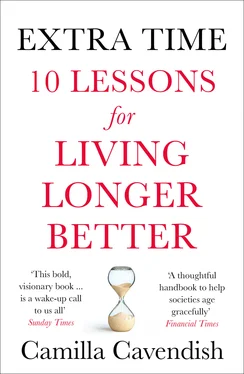From Abbey Road, a prosperous area in the Borough of Westminster with red-brick mansion blocks and detached houses, I’m cycling south to meet a friend for coffee. I’m going to do a route I take often, along backstreets. What I didn’t know, until recently, was that this route spans 10 years of life expectancy. 25
At Abbey Road, female life expectancy at birth is around 87 years and 85 for men. I cycle south, towards Lord’s cricket ground, into Church Street ward. Here, female life expectancy has dropped to 81 years and it’s 80 for men. I make a right turn towards St Mary’s Hospital, Paddington, where I was born, and cut along the canal to Westbourne Park tube station, where I’m meeting my friend. By now, female life expectancy has dropped to 77 years and to 75 for men. In a 15-minute trip, life expectancy has changed by a decade. A baby girl who is born and who lives her life in Abbey Road can expect to live, on average, 10 years longer than one born just 1.5 miles away.
You can find similar gaps in many Western regions. Raj Chetty of Stanford University has found a 15-year gap in lifespan between the poorest and richest Americans. But he has also found that absolute income seems to matter less than where you live. The poorest live five years longer in New York and Los Angeles than they do in Tulsa and Detroit. In those areas, Chetty’s work suggests that smoking, drinking, stress and obesity have more impact on lifespan than income inequality or unemployment, although of course the two are linked.
Are You Heading for a Nursing Home, or the Beach?
‘In the end,’ as Abraham Lincoln said, ‘it is not the years in your life that count. It is the life in your years.’ In surveys, people say repeatedly that they don’t want to live to 100 if that means spending their last years in some ghostly half-life of senescence.
In the twentieth century, when most of us died from infectious diseases, increases in life expectancy generally implied an improvement in health for everybody. In the twenty-first century, that link has broken. Longevity is bringing some people more years of good health, but others more years of frailty.
There are two reasons for this. First, medical advances mean that things which used to kill us, like heart attacks and stroke, are less often fatal. We can keep people alive, stumbling gratefully on, some in good shape, others less so. Second, there has been an explosion in chronic conditions, like type 2 diabetes, high blood pressure, dementia and respiratory disease, which are often linked to smoking, drinking and lack of physical activity.
Differences in those behaviours are one reason why people living in the South East of England, for example, are likely to enjoy eight more years of life free from disability than those who live in the North East, according to the Newcastle epidemiologist Carol Jagger. 26
To get a handle on all of this, statisticians have started to track not only life expectancy but ‘healthy life expectancy’, defined as the years spent in ‘very good’ or ‘good’ health, and ‘disability-free life expectancy’: the years spent without any limiting condition. The methodology is not terribly robust as it’s all based on surveys people fill in, reporting how they feel. The categories are broad too: being in ‘poor health’ could mean that you suffer from arthritis and can’t walk as far as you used to, or that you have early stage dementia. There’s an urgent need for better data. But even so, the patterns are striking.
From as young as 40, some less-educated people report having a ‘functional limitation’ in walking, driving, or some other aspect of daily life. By the age of 60, graduates are in significantly better health than non-graduates. At 85, over half of graduates are still living happily, with no functional limitation. 27We will see in Chapter 5that some highly educated people also seem to have ‘cognitive reserve’, which can be protective against Alzheimer’s.
It is not clear exactly why education is so vital. Some experts argue that education is formative. It may make us better at planning, and exercising self-control, which may feed into healthier lifestyle choices. It also affects the kind of jobs we do. Lower-skilled jobs can be physically taxing, emotionally stressful and – it turns out – bad for health.
The legendary Whitehall II Study of British civil servants, 28led by the epidemiologist Sir Michael Marmot in the early 2000s, found that staff doing the lowest skilled jobs, like messengers and doorkeepers, had a mortality rate three times higher than permanent secretaries and top managers. They also had far higher levels of cortisol, the stress hormone associated with coronary heart disease. 29Marmot’s findings may seem counter-intuitive, but they make sense. Senior executives may work longer hours and face gruelling decisions, but support staff have lower social status, far less control over their working environment and probably a longer commute.
Life has never been fair. But as we live longer, less-educated and poorer people are becoming ‘Old-Old’ earlier than richer and more educated ones, and the gap is widening. 30Professor James Nazroo, at the University of Manchester, has found that when they turn 80, the richest third of Britons is only just beginning to experience the limitations that people in the poorest third have been suffering from 70.
Narrowing that gap, providing people with more equal life chances, must surely be one of the most important social justice missions of our times. The rich and well educated already know some of the secrets to making the most of Extra Time – and there are more in this book. But unless we spread that knowledge to everyone, we will all be the poorer.
One country is leading the way. The Japanese government has set itself an explicit aim of ‘extending Healthy Life Expectancy more than the increase of Average Life Expectancy’ through its Health Japan 21 initiative. 31Ministers are working to actively combat what they call ‘lifestyle-related diseases’ with detailed targets for everything from salt intake to blood pressure levels, to the number of steps people take every day. Different provinces run programmes encouraging people to stay fit, reduce their smoking and drinking, and to take care of themselves.
These schemes are getting traction. The average Japanese man gained an entire extra year of healthy life between 2013 and 2016 (women gained six months). 32This was a win for Extra Time, since life expectancy at birth rose by nine months for men and six months for women in the same period. 33
These schemes build on the strong Japanese tradition of self-reliance. Many Japanese people I have interviewed do not want to be a burden to their children as they age, nor do they expect the state to do everything. They are willing to try and ditch bad habits. If other countries emulate this approach, tackling behaviour throughout the life course, not just at the beginning or the end, we might close the gap.
You’re Only as Old as You Feel
Spring Chicken, a British start-up which sells home gadgets to the elderly, conducted a survey which asked: ‘What age do you feel – on the outside, and on the inside?’ 34Most people between 50 and 90 reported feeling a few years younger than their actual age on the outside, but considerably younger on the inside. The older the respondents, the bigger the gap. Eighty-year-olds in the survey reported that they felt about 50 years old on the inside. Are they delusional, or might they just be on to something?
‘People will say things like, “I still feel 30, it’s just my knees are letting me down,”’ says Anna James, who founded the business after a fruitless and frustrating search for gadgets to help her father, who is 74 and has Parkinson’s. Her father now works in her business and tests out products, yet even he refuses to see himself as needing help. In 2017, James realised her father was getting to the point where he was going to need an electric wheelchair, but he wouldn’t consider it. ‘You’ve got to battle with the psyche,’ she says. So she asked him to test out electric wheelchairs and write a blog about his favourite model. Eventually, the time came. ‘Could I borrow that wheelchair for a few weeks?’ he asked. ‘He took it on a cruise with my mother,’ she says, ‘and ended up selling one to another guest on board!’ This was a man who was still young and dynamic inside – and able to make a sale.
Читать дальше












